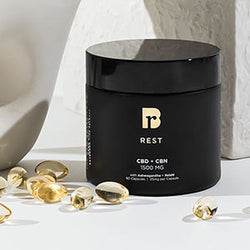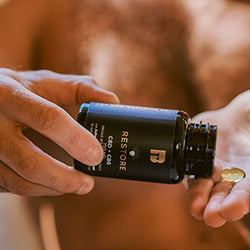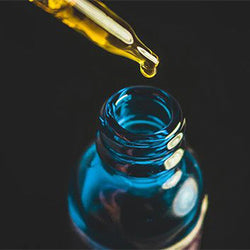
- CBD is a major non-psychoactive component of the Cannabis Sativa plant, also known as Hemp.
- Research highlights that CBD may have anti-inflammatory, antioxidant and anti-nausea benefits, and may help people manage pain and anxiety, although further research is needed.
- THC, another compound in the Cannabis Sativa plant, is a controlled substance in the US.
- Industrial Hemp, grown for hemp fibre, seeds and oils, is naturally low in THC and has higher CBD levels. Other strains of the Cannabis Sativa family have been developed to maximize THC levels. These plants are commonly known as Marijuana.
- To be considered legal in the US, CBD products should have THC amounts below 1 milligram. Such preparations are usually derived from Industrial Hemp.
What is CBD?
CBD is one of a group of over 80 compounds that are found in the Hemp (Cannabis Sativa) plant, known as phyto-cannabinoids.
In recent decades, it’s been discovered that the body produces cannabinoids itself (Endocannabinoids) and has natural receptors that bind to them. Chemicals are also produced that bind to those receptors.
This Endocannabinoid System has a wide range of important functions in helping to regulate the body’s health, including modulation of pain, protection of nerve cells, and the inflammatory process.
For a long time, THC (tetrahydrocannabinol) was the best known of the cannabinoids found in the hemp plant – it produces the mind-altering ‘high’ affects you picture when you think of smoking marijuana.
CBD is another. It is a non-psychoactive compound - it doesn’t get you high. For this reason, interest in the potential health benefits of the compound have increased.
What are the benefits?
Pain relief & inflammation
Cannabinoids, including THC, can help combat inflammation by suppressing the inflammatory response and managing pain perception.
Some experimental models have shown CBD can act as an anti-inflammatory and anti-oxidant by itself and has promise as a potential medicine for the treatment of neuroinflammation and oxidative injury.
CBD can help modulate the overproduction of cytokines, proteins synthesized by immune cells to signal initiation and resolution of inflammation.
One study has shown the important therapeutic action of CBD in reducing gut-inflammation and resulting oxidative damage.
Further scientific research is needed into the effectiveness of CBD alone on inflammation in humans, but people suffering with chronic diseases like arthritis continue to report that CBD products have helped them manage their symptoms.
Effects on Anxiety & Stress
One of the most noticeable effects people report from CBD is an improvement on mood and reduced anxiety levels. This is consistent with role of the endocannabinoid system in constraining the response to stress.
CBD has been shown to significantly decrease blood levels of the stress hormone, cortisol.
It also produces a response from the 5-HT1A receptor (a subtype of serotonin receptor) and from this it’s positive effects on anxiety and neuroprotective effects are thought to follow.
CBD and sleep
It’s said that two-thirds of us survive on inadequate sleep. Sleep affects our mental aptitude and physical vitality and, in an effort to get as much quality sleep as possible, many people use CBD as part of their evening routine.
But CBD actually acts on the same receptors as the stimulant caffeine and can enhance wakefulness. Other studies suggest it may increase total sleep time, though.
CBD may provide you with the relaxed state you need to wind down from the day and many with sleep issues report the balancing effects of CBD before bedtime help them get a good night’s rest. But it might be worth dosing cautiously, at least initially.
Is it legal?
CBD, in its pure form, is not a controlled substance in the US.
Unintentionally or otherwise, though, CBD products may contain other compounds (such as THC, THC-V or CBN) that are classed as controlled substances by Misuse of Drugs Act 1971 and Misuse of Drugs Regulations 2001.
If a product does have trace amounts of the illegal substances in, it may be exempt and lawfully available for human consumption.
The purpose of a CBD product must not be to administer the controlled substances and they must not be easily recoverable from it. The amounts of each controlled substance also must not exceed 1 milligram.
CBD extracts, hemp oil and protein should come from Industrial Hemp plants that typically have less than 1% THC level. With many Manufacturers jumping on the bandwagon and putting CBD into everything, it’s worth asking for Certificates of Analysis to ensure THC levels are below 1 milligram, and also to ensure the CBD content is what it should be.
By contrast, Marijuana strains of Hemp have higher THC and lower CBD amounts. They have been developed over time using unfertilized female plants.
If a female plant is not pollinated, she produces more THC (ranging from 5-35%) and less CBD. Products from such plants are not legally available in the UK unless classed as a Cannabis-based product for Medicinal Purposes and licensed to be proscribed by a limited number of Medical Professionals.
Traveling with CBD products
Whilst CBD itself is legal in the EU, national laws vary across the world. Even if you are confident of CBD’s legal status in your destination country, laws are very often unclear and can be open to interpretation. We strongly recommend you do not bring CBD products with you on international travel.
CBD: Use In Sport
The World Anti-Doping Agency (WADA) prohibits Cannabinoids, with the exception of CBD.
There are areas where CBD may play an important role for athletes, particularly in recovery, and many use it to help manage inflammation, pain and stress.
However, CBD products extracted from cannabis plants can contain varying concentrations of THC that could cause a positive anti-doping test.
As such, the use of any CBD product is at the athlete’s own risk.
The Global DRO can provide athletes with guidance on CBD specific to your sport but, if you compete in sports with a zero-tolerance policy, be very cautious.
The same advice can be taken by those that are drug-tested in relation to their employment.
Is CBD addictive, is it safe?
A World Health Organization (WHO) report has found naturally occurring CBD is safe and well tolerated in humans (and animals), and is not associated with any negative public health effects.
Experts further stated that CBD does not induce physical dependence and is "not associated with abuse potential." The compound doesn’t act on receptors in the brain that are associated with addiction and so isn’t addictive or habit-forming.
Some precautions…
The number of products containing CBD available online or on the high street is great for those interested in exploring their potential benefits.
But it is wise to carefully research suppliers and production methods before making a purchase of a CBD product.
The hemp plant absorbs chemicals, pesticides and heavy metals from soil and water, so check the manufacturers have tested for contaminants, as well as CBD and THC levels.
Consult your doctor before use, especially if you’re on medications. Research into how cannabinoids, including CBD, interact with medications is limited so seeking advice from a medical professional is a must.
Although research into the health benefits of CBD a numerous, it also must be noted that several studies have indicated persistent recreational use of marijuana (with higher THC concentrations) can have adverse effects on mental health, and that someone’s age and individual sensitivity, as well as the potency of the cannabis may lead to permanent psychological disorders. Some studies suggest CBD may counteract some symptoms but further research is needed.
How to start…
There are several ways in which you can take CBD.
CBD tinctures, capsules, vape CBD, edible sweets and skin ointments are popular. The main differences are uptake, how long they take to get into the body, and how long they last.
CBD tinctures allow you to use a pipette to place drops under your tongue – CBD is more readily absorbed here than in the stomach. Users often report that they feel the benefits last for hours.
Edibles can take longer to get into the system and the uptake of CBD isn’t as efficient as from sublingual drops but the support is reported to last for even longer.
Vaporizers work very quickly, reaching full potency almost immediately, but the support doesn’t last as long, many uses feel.
Whichever type of product you try, none are intended to diagnose, cure, prevent or treat medical problems. Always consult a healthcare professional before using any food supplements.
Read product labels to understand its potency and how many milligrams of CBD are in each recommended dose.
Body-weight can sometimes help give an idea of how much to start with but, since it won’t for everyone, start with a small dose and steadily increase if needed.
IMPORTANT NOTE
All information, content or linked materials in this article and on this website is for discussion only and is not medical or legal advice and must not be relied on as such. The information is not a substitute for professional medical expertise. Please see our full Disclaimer and Terms of Service for full details.







